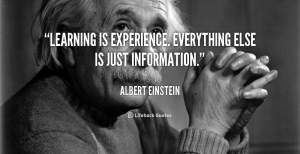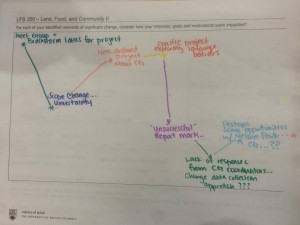It’s that time of the year again, when your stress levels go up and sleep levels go down. Why? Because we have final exams to study for and Christmas presents to buy…but it is also the time to sit down, look back, and reflect on our achievements so far in this school year. From meeting for the first time, brainstorming for ideas, planning a project and then changing our path completely, we have experienced ups and downs together in this journey as a group. We cannot be prouder of what we have achieved together. We have learned a lot from our experience, and can’t wait to share our knowledge with others!
Executive Summary
Community garden participation is greatly encouraged for its potential to address community food insecurity. As a multicultural city, it is observed that the language barriers in Vancouver may jeopardize the participation of multilingual residents in community gardens (CGs). Our CBEL project aims to study the accessibility of CGs to multilingual residents by examining CG demographics and its languages of written resources.
Seventy-four Vancouver CGs were contacted with a short questionnaire via e-mail and phone regarding application process and availability of multilingual garden resources. A low initial response rate shifted our study towards a grounded theory approach, which included interviewing several gardeners and stakeholders to execute case studies. Personal and identifying information of responders were undisclosed for ethical purposes.
Initially, we received 16 out of 74 responses, three of which were automatic replies regarding full waitlists. Four gardens had English-only application materials, and the remaining gardens processed with informal application, such as personal conversation with the prospect gardener or an e-mail request for a plot. We discovered Mandarin instructions for creating CGs on the City of Vancouver (CV) website, which implied multilingual needs. From interviews with two coordinators of the same garden, we received mixed perceptions of the importance of multilingualism within community gardens. An interview with an ESL gardener revealed language barriers and difficulty completing applications. Other CGs interviewed showed appreciation of the concept of multilingual resources, but none had plans to concretize it.
Accessibility is limited for non-English speakers due to the lack of multilingual resources, informal application processes, and long waitlists. Off-season and out-dated information on CV site may have impacted our response rates and results. Vancouver Food Strategy (VFS) strives to empower isolated groups to participate in CGs, as these residents tend to be more susceptible to food insecurity. Many immigrants or Aboriginal residents who have gardening expertise can stimulate cross-cultural interactions by CG participation, leading to improved social capital. Therefore, cultural diversity within CGs is a critical asset in Vancouver.
We suggest updating the CG contact information by CV and increasing funding to prioritize CG multilingualism. CG coordinators should adopt systematic application processes with printed resources. A CG Action Plan much like VFS on urban farming could be implemented to articulate commitments, priorities, and solutions.
What, So What, Now What?
One of the most significant learning experiences of our project this semester was during the process of putting together our presentation. As we outlined our findings and discussed the significance of our project, we were able to reflect on the context of our research. We made connections between the stories heard from community stakeholders to the concepts of community food security that we’ve learned about in LFS 350 and 250.
One of the things we discussed was that the most common response we received from community partners was that they wished for more multilingual resources but didn’t have the resources or time to be translating material. As a multilingual and multicultural group of students living in Vancouver, we experience and embody the diversity of our city, but we also acknowledge the pervasive sentiment that ‘English is good enough’. If most people can communicate in English, then why bother going to the trouble of translating resources? What we learned in this project is that even if everyone appears to be communicating in English fine, it may be because those that aren’t fluent cannot access that community. The story of a gardener who was isolated due to language barriers, but clearly an asset to her community garden, made us realize how important it is to encourage and include those who cannot communicate in English. This woman faces more barriers to participation (from poor language skills potentially leading to feelings of exclusion) than the average English-speaking gardener. It is therefore essential that institutions and communities (like gardens) translate materials in order to reduce these extra barriers that fluent English speakers wouldn’t face, even if it doesn’t seem necessary at the time or for the current community. By not having translated materials, valuable contributions from marginalized community members may be missed.
Choosing to translate materials so that all residents can have access to community gardens is important because it contributes to community food security. Community food security is often an intangible and seemingly unachievable ideal, but it’s clear that if non-English speaking residents are excluded from networks like community gardens or urban farms, than that ideal will be even further out of grasp. This is especially important to ensure that community food security doesn’t just exist for a certain demographic, that it isn’t just affluent English speaking Vancouver residents that are able to use community gardens. We hope that through translating application to community gardens there would be more diversity in membership, and therefore more perspectives on the communities’ food security conversations.
This is important for our group moving forward as we (hopefully!) become professionals working in the food system who can impact a community’s food security. With an awareness and attention to residents whose voices aren’t being heard, we hope to be intentionally inclusive, even if it there doesn’t appear to be a need. It is hard to remember and include the opinions of those that are not there, so we will go into future projects and experiences keeping in mind that language barriers may be preventing residents from participating. Dialoguing and taking action for community food security is already a complex task, but even more so if members of the community are not able to join in on the conversation.
Until next time!

